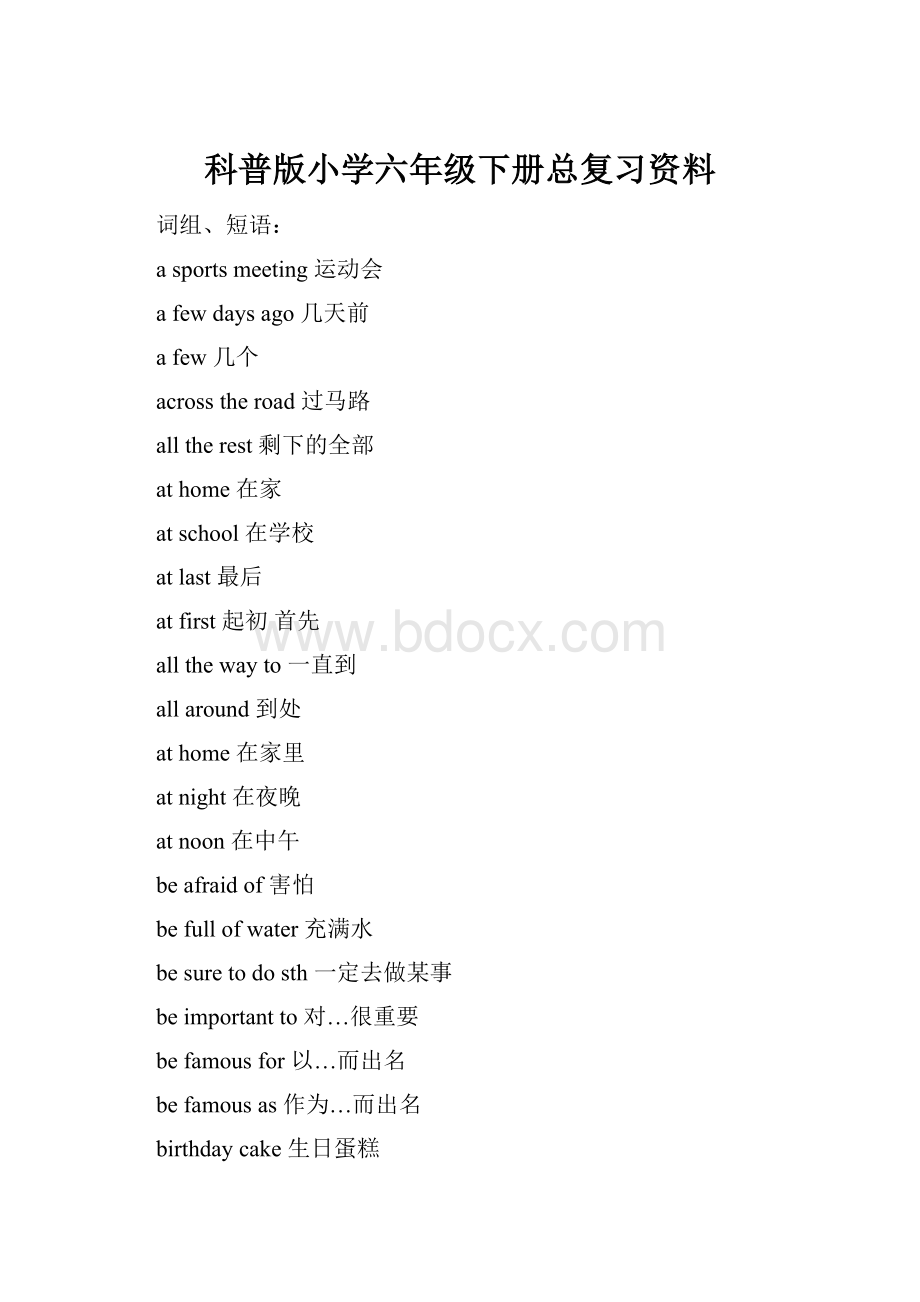科普版小学六年级下册总复习资料.docx
《科普版小学六年级下册总复习资料.docx》由会员分享,可在线阅读,更多相关《科普版小学六年级下册总复习资料.docx(20页珍藏版)》请在冰豆网上搜索。

科普版小学六年级下册总复习资料
词组、短语:
asportsmeeting运动会
afewdaysago几天前
afew几个
acrosstheroad过马路
alltherest剩下的全部
athome在家
atschool在学校
atlast最后
atfirst起初首先
allthewayto一直到
allaround到处
athome在家里
atnight在夜晚
atnoon在中午
beafraidof害怕
befullofwater充满水
besuretodosth一定去做某事
beimportantto对…很重要
befamousfor以…而出名
befamousas作为…而出名
birthdaycake生日蛋糕
buysbsth=buysthforsb为某人买某物
betweenand在……和……之间
bringabout引起
driveabus开汽车
drawapicture画画
drivealongaroad沿着公路驾车
differentkindsof不同种类的
doone’slessons做功课
doone’shomework做某人的家庭作业
doone’sbest尽最大努力
doone’sbesttodosth尽最大努力去做某事
=tryone’sbesttodosth
comein进来
climbup向上爬
cutdown砍伐
comeback回来
callsb给某人打电话
comeup过来
cometoanend结束
everyfouryears每四年
haveasportsmeeting举行一场运动会
haveatest考试
haveanEnglishtest有(进行)一场英语考试
haveto不得不,只好,只得
haveagoodtime玩得开心
heavyrain大雨
hopup向上跳
hopon在……上跳
“have﹢食物﹢for﹢三餐名词”表示哪一餐吃什么
Ineachleapyear每隔几年
intheevening在晚上
thismorning今天早上
tellsbaboutsth告诉某人关于某事
tellsbtodosth告诉某人做某事
thesameage同岁
thedifferentages不同岁
thesedays这些天
laughatsb嘲笑某人
lastSunday上个星期天
Lastweek上周
liveabetterlife过好日子
waitfor等待
watchTV看电视
writeout写出来
What’swrongwithyou?
=What’sthetroublewithyou?
=What’sup?
你怎么了?
Wanttodosth想要做某事
washclothes洗衣服
walkup走上前
walkacross走路穿过
walkoff离开
with…onone’sback某人背上背着•••
with…onone’shand某人手上拿着•••
Whataboutyou?
=Howaboutyou?
Andyou?
你呢?
yesterdayafternoon昨天下午
farfrom离•••很远
keepbirds养鸟
seefarther看的更远
sitdown坐下
showsbsth=showsthtosb给某人看某物
saysorrytosb对某人说抱歉
succeedintrickingsomeone成功地捉弄某人
succeedindoingsth成功做某事
starttodosth看是做某事
sometime一段时间
seeafilm看电影
playbasketball打篮球
visitafriend拜访一个朋友
notanymore=nomore不再
trytodosth试着做某事
flyaway飞走
takephotos拍照
talkwithsb和某人谈话
gofishing去钓鱼
goswimming去游泳
goshopping去购物
goboating去划船
goout出去
goon继续
goon(doing)sth继续……
gotothepark去公园
gototown上县城;上城里去
goback回去
getdown下来
geton上(车、船等),骑上
getoff下车
getup起床
getreadyfor为…做准备
getfoodfrom从…得到食物
jumphighest跳的最高
runfastest跑的最快
lookfor寻找
lookat看着
looklike看起来像
lookafter照顾、
lookout当心小心
lookup向上看
ofthe+基数词几者之中(ofthethree三者之中)
onthe+序数词+floor在第几层楼(Onthefifthfloor在五楼)
onone’sway在•••路上
onone’swayhome在某人回家的路上(home本身是副词不要加to)
onone’swaytotheschool在某人上学的路上
onhiswayhome在他回家的路上
onhiswaytoschool在他去学校的路上
ontheearth在地球上
ontheground在地面上
onthefarm在农场
onthatday在那一天
onSundayevening在周日晚上
otherstudents/pupils其他学生
onSunday在星期日
onSundays在每个星期日
onSundaymorning在星期日早上
oneof…之一(后加名词复数)
notatall一点也不不客气,不用谢
intheschool在学校
inyourclass在你班里
inthemiddle在中间
inredT-shirt穿红色T恤衫的
infrontof在•••前面(物体外面前面)
inthefrontof在•••前面(物体内部前面)
inClass5Grade6在六年级五班
inteacher’soffice在老师的办公室
intheworld在世界上
inthesky在天空中
inacoldwinter再以个寒冷的冬天
insummer在夏天(在四季前都用介词in)
intheevening在晚上(傍晚)
makeakite做风筝
maketheairclean净化空气(make+名词+形容词使…变得怎么样)
flyaway飞走
flybacktoCanada飞回加拿大
flyaplane开飞机
flyto+地点飞往某地
washclothes洗衣服
atlast最后
playajokeonsb.和某人开玩笑
laughat嘲笑
growup长大
takeawalk散步
=goforawalk散步
walkalong沿着……走
walkinsnow在雪上走
TreePlantingDay植树节
keepfrom阻止
keepbirds养鸟
flowaway流失
blowup吹起,刮起
moreandmore越来越多(比较级+比较级:
越来越……)
betterandbetter越来越好
planttrees种树
growrice种水稻
singsongs唱歌
beginto开始
lastSunday上个星期日
inthemorning在早上
thismorning今天早上
everymorning每天早上
nearto离•••很近
farfrom离•••很远
sitdown坐下
siton坐在…上
saysorrytosb对某人说抱歉
saygoodbyetosb和某人告别
sayhellotosb和某人问好
tellsbtodosth.告诉某人做某事
asksbtodosth.叫某人做某事
letsbdosth.让某人做某事(let后面不要加to)
buildabighouse建一所大房子
singsongsforpeople为人们唱歌
wanttobea+职业想成为…
withoutair没有空气
wouldliketodosth想要做某事
=wanttodosth
joinus加入我们
summerholiday暑假
takeatrip去旅行
=goforatrip
takeatriparoundtheworld周游世界
visitsb拜访某人
visitsp参观某地
haveaholiday去度假
theGreatWall长城
thecapitalofChina中国的首都
afriendofhis他的一位朋友
名词+of+名词性物主代词:
…的
fallon落在…上
thiswarmingof……的升温
Itis+形容词+todosth做某事是怎样的
teachsbtodosth教某人做某事
teachstudenttoread教学生读
stayin+地点呆在…
Children’sDay儿童节
Teachers’Day教师节
NationalDay国庆节
Fools’Day愚人节
NationalDay国庆节
反身代词:
myself我自己
ourselves我们自己
yourself你自己
yourselves你们自己
himself他自己
herself她自己
itself它自己
themselves他们自己
两好、两多、两坏、一老、一少、一远
good(好的)/well(健康的)betterbest
bad(坏的)/ill(有病的)worseworst
much/many(多的)moremost
old(老的)older/elderoldest/eldest
little(少的)lessleast
far(远的)farther/furtherfarthest/furthest
不规则的动词过去式:
eat---ate
get—got
is,am——was
are——were
bring——brought
buy——bought
begin——began
call——called
cut——cut
come——came
can——could
have/has——had
hop——hopped
hear——heard
do——did
drive——drove
draw——drew
sit——sat
see——saw
say——said
stop——stopped
start——started
sing——sang
stand——stood
swim——swam
run——ran
fly——flew
find——fond
tell——told
take——took
try——tried
teach——taught
think——thought
go——went
know—knew
get——got
grow——grew
make——made
meet——met
play——played
put——put
walk——walked
live——lived
leave——left
let——let
keep——kept
write——wrote
read/ri:
d/——read/red/wonder——wondered
公式:
最高级句型:
(一般现在时)
1、sb/sth+is+the+最高级+范围(肯定句)
Heisthetallestboyinourclass.(他是我们班最高的男孩)
2、who/which+is+the+最高级+A、BorC(范围)(特殊问句)
Whoisthetallestboyinyourclass?
(在你们班谁最高?
)
3、sb/sth+实意(行为)动词+最高级+范围
Hejumpshighestinourclass.(他在我们班跳得最高。
)
4、who/which+实意(行为)动词+最高级+A、BorC(范围)(特殊问)
Whojumpshighestinyourclass?
(谁在你们班跳得最高。
)
实意动词后加最高级不带“the”Be动词后+最高级带“the”
一般将来时:
肯定句:
1、主语+be+goingtodosth
Heisgoingtogohome.(他将要回家。
)
2、主语+be+动ing+其他(常见动词:
gocomeleavebegin)
Heiscominghere.(他将来这。
)
3、主语+will+动原+其他
Hewilldohishomeworkafterschool.(他放学后将做作业。
)
一般疑问:
4、will+主语+动原+其他
Willhedohishomeworkafterschool?
(他放学后将做作业吗?
)
否定句:
5、主语+will+not+动原+其他
Hewon’tdohishomeworkafterschool.(他放学不做作业。
)
问天气及回答:
What’stheweatherlike+时间/in+地点?
~Itis+天气形容词/Itwill+动词原形
What’stheweatherliketomorrow?
(明天天气怎么样?
)
=Whatwilltheweatherbeliketomorrow?
问职业及回答:
Whatwill+主语dowhen+主语grow(s)up?
(将来时)
主语+willbea+职业(将来时)
①Whatwillyoudowhenyougrowup?
(当你长大后你想做什么)
~Iwillbeateacherwhenyougrowup(当我长大后我想当老师)
②Whatwillhedowhenhegrowsup?
(当他长大后他想做什么)
~Hewillbeateacherwhenhegrowsup.(当他长大后他想当老师)
What+助动词(dodoes)+主语do?
(一般现在时)
主语+bea+职业
①Whatdoyoudo?
(你的职业是什么)
~Iamateacher.(我是一名老师)
②Whatdoeshedo?
(他的职业是什么)
~Heisateacher.
问日期及回答:
What’sthedatetoday?
(今天是几号?
)(现在时)
Itis+月、日
What’sthedatetomorrow?
(明天是几号?
)(将来时)
=What’stomorrow’sdate?
Itis+月、日
Whatdayistoday?
(今天星期几?
)
Todayis+星期几/Itis+星期几
补充:
肯定句变否定句时:
①含有Be动词的直接在Be动词后加not
②含有实意动词的要借助助动词“do”帮忙否定
肯定句变疑问句时:
①含有Be动词的直接把Be动词前提
②含有实意动词的借助助动词“do”帮忙,注意实意动词要变回原形
特殊比较级最高级:
一般过去时:
表示过去某一时间发生的动作或存在的状态。
动词要用过去式。
常见一般过去时的标志:
yesterday(昨天)、lastweek(上周)即last的词组、twomonthsago(两个月前)即ago的词组、thedaybeforeyesterday(前天)、in1990(在1990年)、inthosedays(在那些天里)、once(曾经)
Be动词的一般过去时态
is,am的过去式为was、are的过去式为were
肯定句:
主语+was(were)+宾语(其他)
例:
Iwaslateyesterday.我昨天迟到了。
否定句:
主语+was(were)+not+宾语(其他){直接在Be动词后加not}
例:
Weweren’tlateyesterday.我们昨天没迟到。
一般疑问句:
was(were)+主语+宾语(其他)?
例:
Wereyouillyesterday?
你昨天病了吗?
肯定回答:
Yes,Iwas.{Yes,+主语+was(were)}
否定回答:
No,Iwasn’t.{No,+主语+was(were)+not}
特殊疑问句:
特问词+was(were)+主语+宾语(其他)
例:
Whenwereyouborn?
你什么时候出生的?
实意动词的一般过去时态
肯定句要使用动词的过去式,否定句和疑问句要借助助动词did.
肯定句:
主语+动词过去式+宾语(其他)
例:
Iwenttothezooyesterday.我昨天去动物园了。
否定句:
主语+didn’t+动词原形+宾语(其他)
例:
Wedidn’tgotothezooyesterday.我们昨天没去动物园。
一般疑问句:
Did+主语+动词原形+宾语(其他)?
例:
Didyougotothezooyesterday?
你昨天去动物园了吗?
肯定回答:
Yes,Idid.{Yes,+主语+did}
否定回答:
No,Ididn’t.{No,+主语+didn’t}
特殊疑问句:
特问词+did+主语+动词原形+宾语(其他)
例:
Whatdidyoudoyesterday?
你昨天干嘛了?
at,in,on表示时间的区别
at多用于钟点时刻前
on用于在星期几、具体某一天或某一天的早、午、晚或节日前。
in表示一段时间,用在年、月、星期(周)、四季、morning、afternoon、evening前,但当morning,Sunday等前有this,that,next,last时就要省去in。
学过的语法:
1、一般过去时:
动作发生在过去,现在已经结束了。
从句子中过去的时间和动词的过去式可以看出是过去时。
过去的时间就用动词的过去式。
{在上面}
2、一般将来时:
动作发生在将来。
一般句子中会出现将来的时间和will,will要加动词原形。
如:
Itwillberainytomorrow.
Itwillraintomorrow.
3、一般现在时:
经常性的动作或者一种状态••••••。
主语是第三人称单数(she,he,it…)时动词要用第三人称单数形式,通常与always,often,usually,sometimes等词连用。
如:
Iusuallyhavelunchattwelve.Ilikeswimming.
Heusuallyhaslunchattwelve.Helikesswimming.
动词单三变化规律:
一般情况下:
(1)第三人称单数形式就是在词尾加s;
(2)以s,x,ch,sh,“O”结尾的加es;
(3)辅音字母加y的,y变i再加es
(4)另外,不规则的有:
have—has,do---does等.
like—likes,watch---watches,fly---flies
4、现在进行时:
动作正在进行。
主语+be动词+动词的现在分词--------即am,is,are+动词+ing
注意加ing的方法有:
(1)直接加,如:
play---playing(绿色圃中小学教育网http:
//WWW.Lspjy.cOm原文地址
(2)去e加,如:
take---taking
(3)双写加,如:
sit---sitting,stop—stopping,begin—beginning
swim—swimming,hop—hopping,skip—skipping,forget—forgetting,
travel—travelling,run—running
例句:
Iamswimming.Heisrunning.Whataretheydoing?
5、形容词和副词的级别
形容词和副词的比较级(-er)是两者比较,最高级(-est)是三者以上比较。
句子中Be动词的形容词的最高级前要加the。
比较级:
Youareamontholderthanme.
最高级:
Heisthetallestboyinhisclass.
Hejumpshighestofthethree.
6、序数词的用法以及与年月日相关的句型。
如:
Theteachers’officeisonthethirdfloor.
Children‘sDayisonJune1st.
常见的对划线部分提问。
特殊问词:
Who(谁)、how(问交通方式用)、when(问节日、生日等用)、Whattime(问几点用)Howold(问年龄用)、where(问地点用)、why(原因)、which(哪一个,具有选择性)
1、Myparentstookmethere.
-----Whotookyouthere?
(谁){me变you(第一人称变第二人称)}
2、Wewenttot